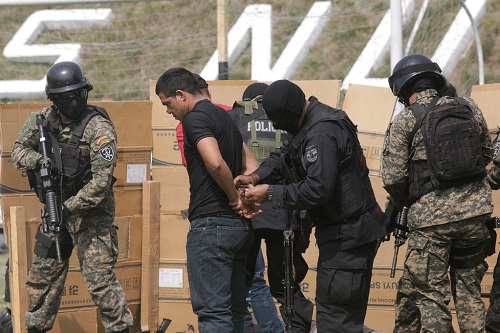flickr photo
By
Ricardo Swire
Caribbean internal security representatives have analysed revised intelligence data that suggests between 2015 and 2017 El Salvador’s Civil Police’s Special Reaction Force, aka Fuerza Especializada de Reaccion (FES), received the most of El Salvador’s more than US$140 million aid from Washington. In April 2016 the collaboration of six hundred Special Forces soldiers and four hundred police officers from El Salvador’s elite units deployed mainly in rural districts. Every year American training programs assist approximately two hundred thousand foreign soldiers, police and crime fighting personnel on every continent except Antarctica.
The US Department of Defense (DOD) allocates a minimum US$122 billion to such programs. Five years ago the Pentagon was managing seventy-one different sections of foreign assistance that “Build Partner Capacity” (BPC). America’s annual State Department foreign military training program disclosures have been vague and difficult to analyse. Critical data is frequently absent or inconsistently reported. With more than one hundred and eighty US authorities and agencies, facilitating foreign military and law enforcement training, adequate oversight has been a shortcoming.
Several of El Salvador’s one thousand strong FES Unit members are named in international human rights dossiers, accused of extrajudicial murders and abuse of force. During the first half of 2017 FES was credited with forty-three of El Salvador’s gang member murders. In August 2017 four FES members who committed three of the extrajudicial killings plus other crimes were identified. A cyber trail showed how the FES quartet used social media to arrange and communicate about extrajudicial murder participation, the rogue agents planning how crime scenes should be staged to appear as confrontations.
CARICOM intelligence officials regard El Salvador as a rapidly emerging player in the transnational trafficking business. The Central American country is a routine drug recipient and warehouse along the Pacific Coast. Sophisticated Salvadorian “Transportistas” such as the Perrones and Texis Cartel move illegal drugs, pirated merchandise, precursor chemicals and illegal migrants across the borders with Guatemala, Honduras and Nicaragua. El Salvador is also a popular bridge via the Pan-American Highway, Fonseca Gulf and along the network of Honduran roads that traverse mostly unpopulated terrain.
In early 2018 El Salvador officially disbanded the Civil Police FES Unit and introduced a Specialized Police Tactical Unit (UTEP). However FES agents who transferred to UTEP were not checked for human rights abuses or criminal offences. UTEP agents have been trained in psychology, academic knowledge and modern weaponry management. Their mission is provision of tactical and technical investigative skills to Antiextorsiones or different domestic police units. El Salvador’s Antihomicidios mainly focus on anti-gang enforcement. Agents ensure MS-13 and Barrio 18 leadership in custody are housed in maximum-security facilities, such as the infamous Zacatecoluca prison also known as “Zacatraz.”
Ricardo Swire
Ricardo Swire is the Principal Consultant at R-L-H Security Consultants & Business Support Services and writes on a number of important issues.



No Comments Yet!
You can be first to comment this post!